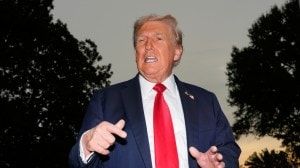Japan clinch Asian Cup in thrilling final
Beirut, October 29: Shigeyoshi Mochizuki only got to play in the Asian Cup final because of Junichi Inamoto's suspension, but he popped up...

Beirut, October 29: Shigeyoshi Mochizuki only got to play in the Asian Cup final because of Junichi Inamoto’s suspension, but he popped up after 29 minutes to score the only goal in their 1-0 victory over Saudi Arabia in a thrilling end-to-end match in front of a packed crowd in Beirut’s City Sportive.
Mochizuki got on the end of Shunsuke Nakamura’s free-kick to open the scoring after Saudi Arabian striker Hamzah Idris had missed an early penalty.
Saudi Arabia chose to play with two big strikers, bringing in Hamzah Idris to partner the youngster Talal Al Meshal.
Sami Al Jaber dropped into mid-field and Fouzi Al Shehri also came in to fill the void left by the suspended Mohammed Nour and Abdullah Jumaan.
Japan, meanwhile replaced Junichi Inamoto, who misses the final after collecting two yellow cards, with Shigeyoshi Mochizuki.
The Kyoto Purple Sanga mid-fielder slotted on the right-hand side and Tomokazu Myojin moved across into central mid-field.
In front of a capacity crowd mainly cheering for Saudi Arabia, the Arab team got off to the better start continually troubling the Japanese defence with long balls forward. After just eight minutes referee Ali Bujsaim of the UAE gave a penalty when Al Meshal was pulled back by Japan captain Ryuzo Morioka, booking Mochizuki in the process.
Hamza Idris stepped forward, but pulled his spot-kick wide of Kawaguchi’s right-hand post with the goalkeeper having guessed the wrong way.
The match settled down after the penalty miss, and chances became less frequent as the Japanese started to get a grip on the game.
In the 29th minute Japan turned that domination into a goal. Ahmad Dukhi became the first Saudi to be booked after he fouled Nakahara. The free-kick from mid-way into the half near the left-hand touchline should have been comfortably dealt with, but a clump of four players all missed Nakamura’s cross and the ball fell to Mochizuki who, making only his second start of the tournament, gleefully stabbed a crisp half-volley past Al Daeyea.
Three minutes from half-time Morishima popped up in the left-hand corner, pulling the ball back to Nakamura who drove the ball towards the far corner only for it to float inches over Daeyea’s bar. Saudi Arabia made a surprising change at half-time, taking of Mohammed Al Khilaiwi and bringing on Abdullah Sulaiman. They also introduced Mohammad Al Shlhoob for Idris. Both got straight into the action. The big Al Ahli defender immediately had to produce a saving tackle on Nakamura, while at the other end ‘Baby Maradona’, fed by Al Temyat, drove a shot just past the far post. Coach Naser Al Johar’s half-time message must have been to impose their style of game on the Japanese because Saudi Arabia managed to increase the pace of the game in the second half. After 48 minutes Al Temyat was equally close when he tried his luck from 25 yards, then Sami Al Jaber bundled a shot inches past the other upright as Al Shlhoob’s presence on the right continued to cause the Japanese problems. The Saudis poured forward and inthe 54th minute Morioka pulled down Al Meshal who was left holding his head in disbelief as his free-kick flashed past the far post. The Shimizu S-Pulse sweeper was booked for the foul. Japan then could have had a penalty on their own after 57 minutes when Takahara squared for Nishizawa, who shielded the ball from Ahmed Khalil who then appeared to pull down the Cerezo Osaka striker. That was a temporary respite from the incessant Saudi pressure and at the other end Kawaguchi was deceived by Shlhoob’s long-range angled shot. Thinking initially that the 20-year-old was crossing, the Japan keeper took two steps forward before flinging himself backwards to tip the effort away. Kawaguchi then produced an even better save in the 63rd minute, diving to his right to hold onto Al Meshal’s bullet-like header from Ahmad Dhuki’s cross. After 20 minutes of almost constant pressure,Japan finally started to retain possession of the ball and, after a neat spell of passing football, Nishizawa managed to turn his defender andforce Daeyea to grope at his near post to push away a 20-yard shot. With a last throw of the dice Saudi Arabia brought on another striker in Marzouq Otaibi, replacing Fouzi Al Shehri after 72 minutes. Five minutes later Nishizawa came close, hooking Mochizuki’s bouncing right-wing cross a yard past Al Daeyea’s far post. The game though was still ranging from end-to-end as Japan, perhaps missing the influence of Inamoto, could not slow the pace of the match. In the 83rd minute Saudi Arabia fashioned one of their best chances of the match. After Hattori failed to deal with one cross, Ahmed Dukhi whipped the ball back in for Sami Al Jaber who, unmarked at the edge of the six-yard post, headed fractionally over the bar and then fell onto his back in disbelief. With four minutes left Kawaguchi produced another match-winning save and sealed his Sanyo MVP award, when Al Temyat’s 25-yard drive bounced awkwardly in front of him on its way to the bottom corner, Kawaguchi somehow palmed the ball up over the bar. Japanthen made a strange change, taking off Atsushi Yanagisawa seven minutes after he himself came on as a substitute and bringing on Daisuke Oku instead. Almost instantly Shinji Ono replaced Morishima as the fourth official signalled that there would be five minutes of injury time. The Saudis strived to find an equaliser, but to no avail and Japan held on to win a superb match and a fitting finale to one of the best Asian Cups ever.



- 01
- 02
- 03
- 04
- 05



























